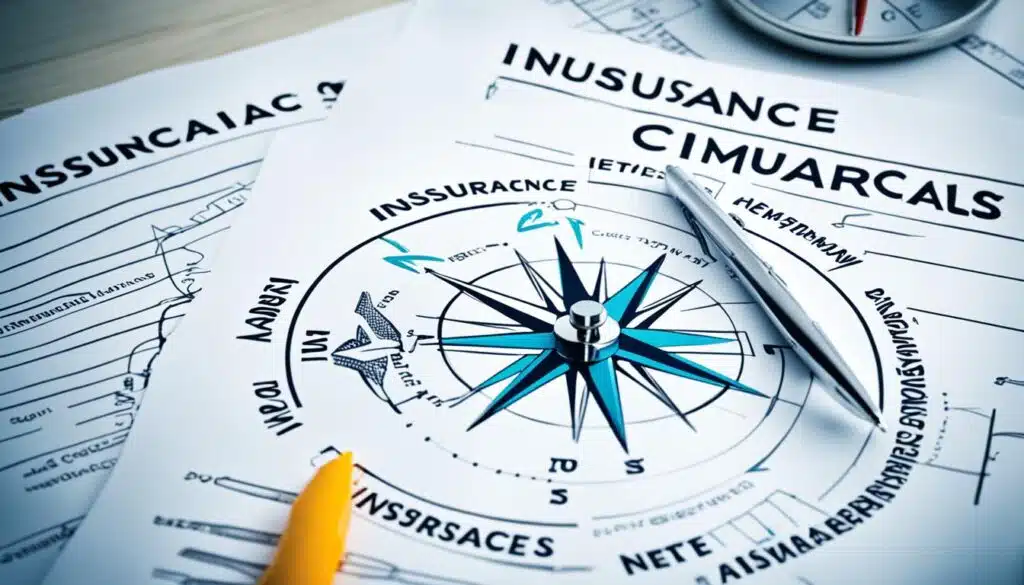Businesses face many changes, making the insurance renewal process key to managing risks. It’s vital to keep the right coverage at a good price for your business to grow. This guide will give you the insights and tips to handle insurance renewals well. It helps you make smart choices and keep your coverage in line with your business goals.
Key Takeaways
- Understanding the importance of the insurance renewal process is crucial for businesses to maintain proper coverage and manage risks effectively.
- Factors such as changes in your business operations, industry trends, and market conditions can significantly impact your insurance renewal.
- Adopting best practices, such as starting the renewal process early and maintaining transparent communication with your insurer, can help you secure the most favorable terms.
- Building strong relationships with your insurance agents and producers can provide valuable insights and support throughout the renewal process.
- Proactive risk management and a comprehensive submission can demonstrate your institution’s commitment to risk mitigation, positively influencing the renewal outcome.
Understanding the Insurance Renewal Process
Keeping your business insured is key to handling risks well. The renewal process is vital for this, making sure you stay protected. It’s important to renew on time to avoid coverage gaps. These gaps could lead to big financial losses if you need to make a claim.
Why Insurance Renewal Is Important
Renewing your insurance lets you check if your coverage still fits your business. Doing it on time shows you’re serious about managing risks well. This can help with underwriting and pricing.
Factors Affecting Insurance Renewals
Many things can change how insurance renewal works. This includes your business’s past claims, risk level, and industry changes. Underwriters look at these when setting renewal terms and prices. If your business grows or changes what you offer, this can also affect renewal. Plus, big economic and industry shifts can change how easy it is to get insurance and what it costs.
| Factors Impacting Insurance Renewal | Description |
|---|---|
| Loss History | Underwriters will analyze the business’s claims record to assess risk. |
| Risk Profile | The organization’s overall risk management practices and exposure. |
| Industry Trends | Shifts in the business’s industry that may affect insurance requirements. |
| Market Conditions | Broader economic and industry factors that impact insurance availability and pricing. |
Knowing how the renewal process works and what affects it helps businesses get ready. This way, they can keep their insurance up to date. This helps them manage risks and keep their business running smoothly.
Best Practices for Insurance Renewal

Dealing with insurance renewal can be tough, but following best practices makes it easier. Start by beginning the renewal process early and keep clear communication with your insurance providers.
Start Early and Shop Around
It’s key to start the renewal process early, about 60 to 90 days before your policy ends. This gives you time to check your current coverage, gather needed info, and look for better rates. Starting early helps you avoid the stress of rushing and ensures a smooth move to the new policy.
When looking for insurance, getting quotes from several providers is a must. This way, you can find the best coverage and rates. Comparing options and negotiating with insurers can lead to better terms and more protection for your business.
Be Transparent and Communicate Effectively
Being open with your insurance providers is another top tip for renewal. Share your risk profile, claims history, and any new info since last renewal. This helps insurers understand your risk better and might lead to better terms for you.
Talking well with your insurance agent or broker is also key. They can be a big help in negotiating and advocating for you. Keep in touch, share important updates, and keep the lines open for a successful renewal.
“Transparency and open communication are key to navigating the insurance renewal process successfully. By starting early and shopping around, businesses can secure the best possible coverage and rates for their organization.”
Building Strong Relationships for Renewals
It’s key to build and keep strong ties with insurance providers for renewal. By building trust and rapport with insurers, businesses can show they’re important clients. This can lead to better terms when it’s time to renew. It’s about staying in touch with the insurance agent or broker, sharing info on time, and showing you care about managing risks.
Creating personal connections makes it harder for insurers to just say no or raise rates without looking at your business’s special needs. Building these relationships is vital for both getting through renewal and keeping your business strong over time.
Strategies for Strengthening Insurance Provider Relationships
- Talk often and openly with your insurance agent or broker
- Share correct and timely details about your business and risks
- Show you’re serious about managing risks and preventing losses
- Go to industry events and networking to make more connections
- Offer to share stories or feedback on your good experiences with the insurer
| Benefit | Description |
|---|---|
| Favorable Renewal Terms | Good relationships with insurers can mean better renewal deals, like lower costs or more coverage. |
| Priority Treatment | Businesses with strong ties with insurers get priority, making the renewal process smoother and quicker. |
| Risk Mitigation Assistance | Insurers are more likely to help with risk management when they have a strong bond with you. |
“Investing time and effort into building relationships with insurance providers can pay dividends when it comes to the renewal process and beyond.”
Risk Management and Insurance Renewal

Effective risk management is key in the insurance renewal process. By using strong risk control and mitigation, businesses show they manage risks well. This can lead to better renewal terms, like lower premiums and more coverage options.
Impact of Risk Control and Mitigation
Businesses that focus on risk management get better insurance renewal terms. They do this by having safety protocols, keeping property in good shape, and having business continuity plans. Insurers see the value in these efforts and offer better rates and coverage to such businesses.
Presenting Your Institution’s Risk Profile
When getting ready for insurance renewal, it’s important to clearly share your risk profile with insurers. This means giving them details about your operations, assets, and risks, along with how you manage them. By being open and accurate, businesses can help insurers understand their risks better. This can lead to better renewal terms and prices.
Using strong risk management strategies for insurance renewal can greatly affect the renewal process. It helps in presenting and communicating your risk profile to insurers. This way, businesses can increase their chances of getting good insurance renewal outcomes.
“Effective risk management is not just about protecting your business, it’s about positioning it for success in the insurance renewal process.”
Preparing a Comprehensive Submission

Creating a thorough and well-organized insurance renewal submission is key. It should include details about the business, like its history and operations. Also, it should cover risk management, claims history, property details, and the leadership team’s background.
Elements of a Top-Notch Submission
Going beyond the basics can show a business’s dedication to risk management. This can make insurers more likely to renew coverage on good terms. Here are some important parts of a strong insurance renewal submission:
- Detailed business overview, including history, operations, and risk management
- Comprehensive claims history and property details
- Credentials and experience of the leadership team
- Explanation of any significant changes since the last renewal
- Demonstration of proactive risk control and mitigation efforts
- Clear communication of the organization’s risk profile and risk appetite
Putting these elements together can boost a business’s chances of a successful insurance renewal submission. This can lead to better terms for coverage.
| Component | Description |
|---|---|
| Detailed business overview | Provide a comprehensive narrative about the organization’s history, operations, and risk management practices. |
| Claims history and property details | Include comprehensive information about the organization’s claims experience and property characteristics. |
| Leadership team credentials | Highlight the experience and expertise of the organization’s leadership team. |
| Changes since last renewal | Explain any significant changes within the organization since the previous insurance renewal. |
| Risk control and mitigation | Demonstrate the organization’s proactive efforts in managing and mitigating risks. |
| Risk profile and appetite | Clearly communicate the organization’s risk profile and its willingness to accept certain levels of risk. |
By preparing a comprehensive and structured insurance renewal submission, businesses can improve their chances of getting good coverage terms. They also show their commitment to managing risks well.
The Role of Insurance Agents and Producers
Dealing with insurance renewal can be tough, but insurance agents and producers are key long-term care. They connect businesses with health insurance companies. They make sure the renewal goes smoothly and works well for everyone’s mental health.
Insurance agents and producers know a lot about the industry. They work hard to show businesses need to take as important to insurers. This helps create a strong partnership enrolled in medicaid. A good agent makes sure the renewal meets what the insurer wants, leading to better prices and coverage.
The importance of insurance agents in renewal is huge. They fight for their clients, negotiating and making sure their needs are met. The value of insurance producers in the renewal process is clear, as they use their connections and knowledge to get the best deals for their clients.
Insurance brokers also play a big part in renewal. They know the insurance market well. They guide businesses through the renewal process and help find the right coverage.
| Key Responsibilities of Insurance Agents and Producers |
|---|
|
In conclusion, the role of insurance agents and producers is crucial. Their knowledge, connections, and focus on their clients’ needs are key to a successful medicare renewal.
Adhering to Renewal Process Best Practices
Understanding the insurance renewal timeline and key milestones is crucial for a smooth renewal. Following best practices ensures businesses can renew without issues, keeping health care coverage continuous and avoiding gaps.
Renewal Timeline and Milestones
The insurance renewal timeline starts 3-4 months before the policy ends. This gives enough time to collect info, get quotes, and review the final offer 30 days before the new policy starts. This structured plan helps businesses get the attention they need from insurers and make timely changes.
The key milestones in the insurance renewal process include:
- Initial meeting with the insurance agent or broker to establish a clear plan and timeline
- Gathering and organizing all relevant information, including claims history, risk exposures, and coverage requirements
- Obtaining quotes from multiple insurers and comparing options
- Reviewing the final proposal and negotiating any necessary changes
- Finalizing the renewal and ensuring all paperwork is completed before the policy’s effective date
By following these best practices for the insurance renewal timeline, businesses can have a smooth renewal process. This protects their operations and financial interests.
Insurance Renewal

Understanding how to handle insurance policy renewal, commercial insurance renewal, and business insurance renewal is key for any business. It helps keep the right coverage to protect against risks and disruptions. By getting to know the renewal process, health services companies can make sure they have the coverage they need for the future.
The renewal process means checking your current policies, seeing what your business needs now, and talking with providers for the best deals. This guide offers tips and strategies to help businesses feel confident when renewing their insurance. It aims to help them get the right coverage for growth and success.
Renewing Your Coverage with Confidence
To do well in the insurance policy renewal process, businesses should keep these tips in mind:
- Start early to have time to look at different options.
- Keep clear communication with your insurance providers, sharing all you need to know about your business.
- Use your connections with insurance agents and producers for a smoother renewal.
- Check your policy carefully to see if you need to make any changes.
- Use strong risk management to show you’re serious about lowering risks.
By following these tips and being proactive, businesses can get the best and most affordable coverage. This helps them succeed in the long run.
| Renewal Consideration | Best Practice |
|---|---|
| Timing | Start the renewal process early, typically 90-120 days before the policy expiration date. |
| Communication | Maintain open and transparent communication with your insurance providers, providing all relevant information about your business’s risk profile and needs. |
| Relationship Management | Leverage your established relationships with insurance agents and producers to ensure a smooth renewal experience. |
| Policy Review | Carefully review your policy terms and coverage limits to identify any gaps or areas that may require adjustments. |
| Risk Management | Implement robust risk management strategies to demonstrate your commitment to minimizing potential risks. |
By following these tips and being proactive, businesses can get the best and most affordable coverage. This helps them succeed in the long run.
“Effective insurance renewal is not just about finding the lowest price; it’s about identifying the coverage that best aligns with your business’s evolving needs and risk profile.”
Also Read : What Are The Basics Of Insurance For Beginners?
Conclusion
The insurance renewal process is key for businesses to manage risks well. It’s important to know how to renew on time and what affects the process. This way, companies can keep the right coverage at a good price in health care.
Building strong relationships with insurance companies is vital. Also, having good risk management strategies and a detailed renewal plan are essential. These steps help in a successful renewal.
This guide offers tips and strategies for renewing insurance with confidence. It helps businesses get the right coverage for their growth and success. The insurance renewal conclusion, summary of insurance renewal process, and key takeaways for insurance renewal give a clear path for managing renewals and reducing risks.
The insurance renewal process is complex but manageable with the right approach. By staying informed and proactive, businesses can handle it smoothly. This process can be a chance to improve risk management and support ongoing success.
FAQs
Q: How do I qualify for Medicaid renewal?
A: To qualify for Medicaid renewal, you must meet the eligibility criteria set by the state health department. You can contact the department or check the renewal form for specific requirements.
Q: What steps are involved in renewing my health coverage?
A: To renew your health coverage, you need to complete and return your renewal form before the due date. You may also have the option to complete your renewal online or through other methods specified in your renewal packet.
Q: How can I enroll in a managed care plan as part of the renewal process?
A: If you are eligible for renewal in a managed care plan, you will need to follow the enrollment instructions provided in your renewal packet. This may involve submitting additional information or choosing a plan that best fits your healthcare needs.
Q: What should I do if I need assistance with my renewal?
A: If you need help with your renewal or have questions about the process, please contact customer service or the relevant stakeholder for guidance. They can assist you in completing your renewal and maintaining your health coverage.
Q: What happens if I miss the renewal deadline?
A: Missing the renewal deadline may result in a lapse or cancellation of your health coverage. It is important to submit your renewal form before the due date to avoid any disruptions in your healthcare services.
Q: Is there a grace period for renewing my Medicaid coverage?
A: Some states may offer a grace period for renewing Medicaid coverage after the deadline. Check with the agency or department managing your renewal process to see if you qualify for an extension.
Q: Can my employer help me with the insurance renewal process?
A: Your employer may provide assistance or information regarding insurance renewal, especially if they offer health benefits. They can help you understand your options and requirements for maintaining coverage through your workplace.





